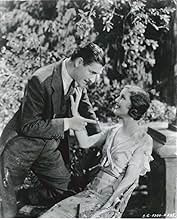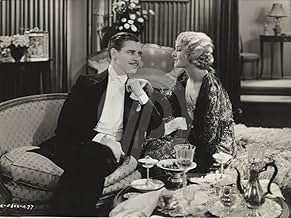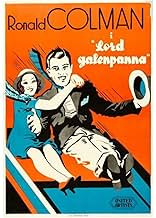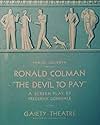Ajouter une intrigue dans votre langueSpendthrift Willie Leyland again returns to the family home in London penniless. His father is none too pleased but Willie smooth-talks him into letting him stay. At the same time, he turns ... Tout lireSpendthrift Willie Leyland again returns to the family home in London penniless. His father is none too pleased but Willie smooth-talks him into letting him stay. At the same time, he turns the charm on Dorothy Hope, whose father is big in linoleum and who, before Willie's arriva... Tout lireSpendthrift Willie Leyland again returns to the family home in London penniless. His father is none too pleased but Willie smooth-talks him into letting him stay. At the same time, he turns the charm on Dorothy Hope, whose father is big in linoleum and who, before Willie's arrival, was about to become engaged to a Russian aristocrat.
- Réalisation
- Scénario
- Casting principal
- Récompenses
- 2 victoires et 1 nomination au total
- Arthur
- (as Crawford Kent)
- Bidder for Bed
- (non crédité)
- Molly - Mary Crayle's Maid
- (non crédité)
- Racing Fan at Derby
- (non crédité)
- Mrs. Hope
- (non crédité)
- Taxi Driver
- (non crédité)
- Pet Shop Owner
- (non crédité)
- Club Member
- (non crédité)
- Butler
- (non crédité)
- Lord Leland's Butler
- (non crédité)
- Porter
- (non crédité)
Avis à la une
I like the way we're introduced to Willie's soft heart when he relents to buy eager mutt George from the pet store. Some such insight is needed since, aside from his antics, Willie's character is yet undefined. Producer Goldwyn had an obvious eye for up and comers like actresses Young and Loy who get the fashionable gowns, along with winning personalities and a shot at acting chops. Also, the production's well-upholstered befitting the background wealth. Then too, this is pre-Depression (1930) so the screenplay needn't worry about class issues that would soon prevail. Should also note the rotund Fred Kerr who plays Dorothy's dad like a really grouchy Winston Churchill-- I thought the physical resemblance striking. Anyway, it's an entertaining little flick that features an unusual character for a leading man, so give it a try since the sub-textual values cut across eras.
But, the main character of the film, around whom the whole plot revolves, is the more well-known actor at the time, Ronald Colman. His career too began in the silent films. He was 26 when he made his first film in 1917, and he was a popular star by 1930. He had 30 films to his credit, some of which were silent classics. Colman was 22 years older than Young when this film was made - his 39 to her 17. But, besides being a standout talent already in her teens, Loretta Young was a girl who looked much more mature and older than her age - but just the right number of years.
While this is a good comedy, it has a feel of being somewhat disjointed. There are no apparent holes in the plot, but there's no stream that holds together the earliest scene of Willie Hale's (Colman) disposition of his property and goods in South Africa, and then his appearance back home after an absence of two years. Colman gives a nonchalant treatment to his character that is a trademark in his comedies. But, in this case, his wistfulness with his father, Lord Leland (played by Frederick Kerr) is so pronounced that it's hard to take him at all seriously. So, did he fear his father's reaction and treatment, or was that just nonsense?
The story has a nice ending - a type that should be familiar to fans of old black and white movies. There isn't any great acting in here, but Colman's presence is commanding in his scenes. That's most often because one is waiting for and expecting the next bit of comedy or witticism to come from him. Indeed, without the comedy in the dialog, this film wouldn't be much worth watching.
Fans of Colman, Young and Loy should enjoy this film, and others who like the older movies may be entertained by it. But modern audiences would probably struggle to sit through this film. Here are some favorite lines.
Willie Hale, to his father, Lord Leland, "Oh, come now. How could anything I do disgrace you?... Anything disgraceful that I may do merely gains for you an unfair sympathy from a sycophantic world."
Lord Leland, "Now...now you're blaming me for bringing you into the world!" Willie Hale, "Heh, heh, I should be extremely mortified for your sake if I had to blame anyone else."
Willie Hale, "Have you had a moment's boredom since I've been in the wrong? No! Your only trouble is, you have the father complex - 'Here's my son and he hasn't done any of the things I should like him to do and for that reason I should kick him out.'"
Mary, "I'd shoot anyone who tried to take you from me, Willie." Willie, "Are you a good shot?"
Lord Leland, "Well, then, what do you want to go to New Zealand for?" Willie Hale, "Because, if I ever want to go to Australia, I'll be near."
Le saviez-vous
- AnecdotesThe film's original director was Irving Cummings with Dorothy being played by Constance Cummings. After some scenes were shot, George Fitzmaurice replaced Cummings as director, and Loretta Young took over the role of Dorothy, with all previous scenes re-shot.
- GaffesBoom microphone shadow is unmistakable in a number of interior scenes toward the beginning of the film.
- Citations
Lord Leland: Here it is half-past nine and not a sign of him.
Dorothy Hope: Have you called the police?
Lord Leland: Do you know Master Willie?
Dorothy Hope: No, I've never met him.
Lord Leland: Well, if you had, you'd know telephoning a policeman's wife would be more effective.
- ConnexionsReferenced in Sa douce maison (1933)
Meilleurs choix
- How long is The Devil to Pay!?Alimenté par Alexa
Détails
- Durée1 heure 12 minutes
- Couleur
- Mixage
Contribuer à cette page



































